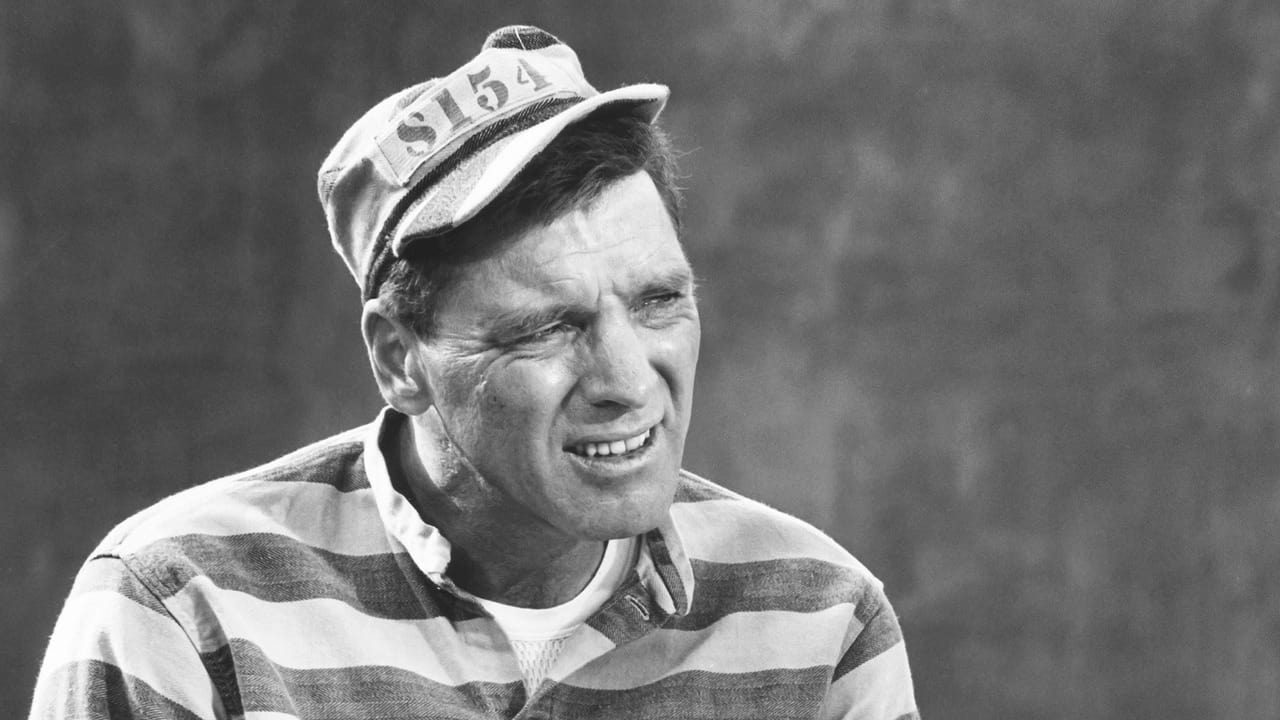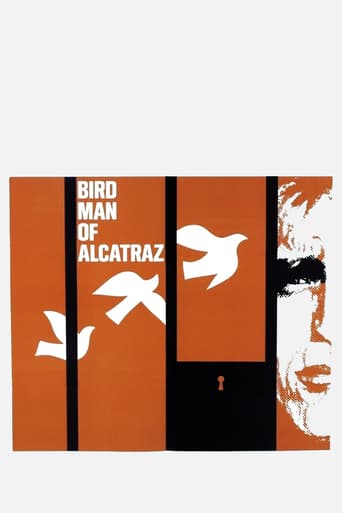

In the words of an Alcatraz inmate "Burt Lancaster owes us an apology." This movie falsely tells the story of convicted homicidal murderer Robert Stroud. I read about and dud a thesis on Stroud. For one the movie tries to portray Stroud as a mild mannered misunderstood man. In fact he was a perverted psychopathic killer. Stroud was dangerous. He was kept in isolation because he was too violent. Keeping and feeding birds doesn't redeem an unrepentant murderer.
... View MoreBirdman of Alcatraz isn't just a movie, it's an experience. The story of a man who's able to lead a meaning and productive life despite serving a life sentence in solitary confinement. A man who is able to create an empire of bird keeping and aviary research within the solitary confinement quarters of a prison. When I first watched the movie I only vaguely knew about the story and I was in awe as just how his empire gradually comes to be. I don't know what it's like to be isolated in a confined area for days on end but I suspect this movie may provide the closest feeling I could ever get to it; black & white cinematography and claustrophobic prison cells go hand in hand.Birdman of Alcatraz made me a fan of Burt Lancaster. It was not the first film I had seen him in but it was the first at which I was struck at what an immense powerhouse of an actor he is, carrying a two and a half hour long, mostly single location picture. His portrayal of Robert Stroud is the classic characterisation of tough on the outside, soft on the inside but Lancaster's immense performance prevents this from coming of as a corny dichotomy. Stroud's relationship with his mother even has shades to the Cody Jarret mother complex; yet I find the most compelling relationship in the movie is of that between Stroud and the warden played by Karl Malden, which I feel is summed up with one line (and one of my favourite movie quotes), "That convict has been a thorn in my side for 35 years but I'll give him one thing, he never lied to me."Like many biographical films, Birdman of Alcatraz receives criticism with the historical liberties taken; most prominently in this instance the fact that the real Robert Stroud was reportedly an incredibly unpleasant individual. I'll say it now and I'll say it again: Movies are not documentaries. When adapting a real life story to the screen, changes and liberties are likely going to be made for the sake of storytelling and entertainment; would a story closer to the truth have been more interesting? My second rebuttal to the 'not historically accurate' criticism is that how many people would even be aware of certain historical figures if it wasn't for their film biopics; movies can act as a gateway to learning about history. After watching Birdman of Alcatraz I wanted to read about the real Robert Stroud, otherwise I might not have even heard of the man.
... View MoreThought-provoking studio of a prisoner , Robert Stroud , who during many years in prison became a world-renowned bird authority . At one point, the real Robert Stroud had over 400 birds in his cell . Burt Lancaster plays Stroud , in one of his best acting as the convict murderer and according to the biography of Robert Stroud , he killed the prison guard because he was denied a visit from his brother, not his mother as portrayed in the film. However , Robert Stroud really should be known as the "Birdman of Leavenworth," since it was there that he kept his birds and did his research , he was not actually allowed any birds during his time at Alcatraz. Due to this popular movie, the real Robert Stroud became one of the most famous inmates of the federal prison at Alcatraz, second only to mob boss 'Al Capone . The real Stroud was an extremely difficult and demented inmate who, though highly intelligent, was a vicious killer and a psychopath , spending 53 years in prison. Robert Stroud died the day before the assassination of President John F. Kennedy; therefore news of his death was not well publicized. This is a pensive examen of an inmate and contains emotion , imaginative sidelights , interesting dialog ; though overlong and sometimes static . Very good acting by Burt Lancaster as a surly convicted murderer held in permanent isolation who redeems himself when he becomes a renowned bird expert .Well produced by the same Lancaster and United Artists . In fact , Burt Lancaster was forced by United Artists to make four films for $150,000 a picture in the 1960s: The young savages , The Alcatraz Birdman , The train and The Hallelujah trail rather than his normal fee of $750,000, because of cost overruns at his production company, Hecht-Hill-Lancaster, for which he was personally responsible . Extraordinary support cast gives magnificent performance such as Karl Malden as Harvey Shoemaker , Thelma Ritter as Elizabeth Stroud , Neville Brand as Bull Ransom , Telly Savalas as Feto Gomez , Edmond O'Brien as Thomas Gaddis , Hugh Marlowe as Albert Comstock , Whit Bissell as Dr. Ellis and Betty Field as Robert Stroud's wife and business partner, whom he married while in jail, she was actually called Della Mae Jones . Atmospheric cinematography by Burnet Guffey , one of the main cameraman of Noir Film along with cinematographer John Alton , the latter was fired two weeks into production and replaced by Guffey . Evocative as well as sensitive musical score by Elmer Bernstein . The motion picture was stunningly directed by John Frankenheimer , though Charles Crichton was fired several weeks into production to be replaced . At the beginning Frankenheimer worked for TV and turned to the cinema industry with The Young Stranger (1957) . Disappointed his with first feature film experience he came back to his successful television career directing a total of 152 live television shows in the 50s . He took another opportunity to change to the big screen , collaborating with Burt Lancaster in The Young Savages (1961) and Birdman of Alcatraz (62) ending up becoming a successful director well-known by his skills with actors and expressing on movies his views on important social deeds and philosophical events and film-making some classics as ¨The Manchurian candidate¨, ¨Seven days of May¨ and ¨The Train¨ and , in addition , ¨Grand Prix¨ also with great car races . Later on , he went on directing nice films such as ¨I Walk the line¨, ¨The gypsy moths¨, ¨Black Sunday¨ ,¨French Connection 2¨, ¨Ronin¨, among others . Rating : Better than average and well worth seeing . The flick will appeal to Burt Lancaster fans .
... View MoreOne questions why a 73-year-old man who has spent more than 43 years in solitary confinement hasn't been paroled by Federal authorities like the Attorney General. Could they have based their rejections on facts and incidents not observed in the almost uniformly good behavior of the eponymous Birdman? Regardless, these uncertainties don't discredit the generally forceful special pleading and stark drama involved in the history of a basically unlettered man whose rehabilitation was affected in a remarkable and, perhaps, unprecedented manner. If what we see in the film is just as true as what may be omitted, he's still an enormously sympathetic character. Were he to have committed a cold-blooded crime, for example, that wouldn't overturn the tender humanity genuinely evinced with such integrity in what Frankenheimer shows us. Birdman of Alcatraz is shaped with subtlety and almost unilateral attention to characterization, the result being that the characters, from start to finish, and thus the whole film in all its pros and cons, are remarkable and invigorating.The lifer's stubbornness is his artistic methodology, voiced early on by his loyal guard who says, "You ain't got much, but you keep subtractin'!" Lancaster's Robert Stroud is the "real and living man" of the film's caption, a massive mama's boy shown to us while traveling to Leavenworth where he meets Malden's single-mindedly despotic warden, his arch-rival. In solitary confinement the homicidal "dingbat" finds himself keen on a fallen sparrow and steadily transforms his cell into a makeshift aviary.In this in-depth, far-reaching construct of the Frankenheimer social exile, the solemnity of this biopic gives persuasiveness to the cutting silliness of men who resort to canaries simply so they don't shank one another and then become old together anyhow. It's about the arduous physical effort of science, about learning consideration from that guard, played by Neville Brand, about pushing to discover means to break their confined environs. Notice the way Frankenheimer has the brass band in the dinner hall fall quiet so we can hear the shiv going into a stomach. And notice the twist of its supporting cast, an outstanding rota of transformations: Telly Savalas's monologue about ugly parrots and ugly girlfriends, the spasm on Thelma Ritter's mouth that betrays her as the connection to Angela Lansbury's motherly monster in The Manchurian Candidate. In spite of it all, the movie's postscript reflects the present world from Stroud's unflappable outlook.Frankenheimer's control focuses on the growth of his hero, a gloomy, outwardly unfixable lifer, rescued from capital punishment by the appeals of his mother to Mrs. Woodrow Wilson, into an autodidactic scientific examiner and a man whose survival thus adopted significance and import. The collaboration between director and star stand out with realism of fine distinction and regulation. We're inclined to accept as true that the hatchling sparrow he discovers when he takes his forlorn exercise time will budge this callous convict out of his desolation.The more his noble concern with keeping it alive grows, the more we're awestruck by his longing to understand more about the virus that kills some of the numerous feathered companions he finagles to be allowed to raise. What's fascinating about it? His interest is not intellectual. It's primal. His rapport with that neighboring inmate through the bricks, played in inarticulate but entirely telling fashion by Savalas, is less about Lancaster's re-emergence from anti-social patterns than it is about the infectiousness of the human instinct to have companionship and understand more. In such a dark, dank milieu, with such somberly hushed tones throughout, we applaud the notion that, in the end, his overpoweringly acute passion for these animals, a devotion that fuels his will to live in his captivity, gives rise to his maturity as a man of knowledge and the author of a classic volume on diseases and cures in ornithology.The devotion of Tom Gaddis, who wrote Stroud's biography, as well as the attachment of screenwriter Guy Trosper, together with Frankenheimer and Lancaster, are palpable and real. The drama they extracted from the up-to-then ongoing true story is both touching and credible albeit the entirety of the particulars don't emerge on the screen. As the dramatization of the profile of an inmate uncommon, if not exceptional, to the history of American penology, it keeps part of the portrait in shadow, but it is, all the same, a meditative and compelling story that cuts into the soul notwithstanding its oversights. An acknowledgment of the nerve required to blaze a trail, this is unquestionably one of Frankenheimer's most contemplative films.
... View More